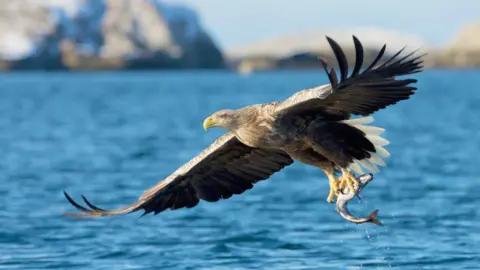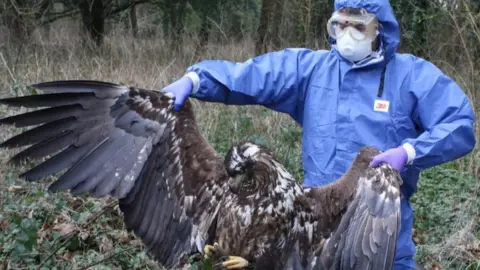Isle of Wight sea eagles: No police action over Dorset death
 Getty Images
Getty ImagesNo further action is being taken over a rare sea eagle that was found dead, Dorset Police has confirmed.
The bird, from a group reintroduced on the Isle of Wight, was found dead in Dorset in January.
A police statement said tests on the carcass had proved inconclusive.
Although high levels of the poison brodifacoum were detected in the bird, it was not possible to tell if they were due to a deliberate act, police said.
Warning: This story contains an image that some readers may find upsetting
The bird - one of three found dead this year - was part of an ongoing conservation project, run by Forestry England and the Roy Dennis Wildlife Foundation.
The birds are all fitted with GPS tracking devices, allowing their flight paths to be monitored.
 Dorset Police
Dorset PoliceFollowing the deaths in January, Dorset West MP Chris Loder said police should not spend time and resources on such an investigation.
He added Dorset was "not the place for eagles to be reintroduced".
His comments were described as "sinister" by TV naturalist Chris Packham.
The project started in 2019 and sees at least six birds released annually on the Isle of Wight.
Data from the trackers has shown they explore widely, making flights of more than 100 miles (160km).
Within the UK, they have flown as far as Cornwall and the north of Scotland, while some have made journeys to France, the Netherlands, Germany and Denmark.
Many of them return to the island after their travels.
The Isle of Wight was chosen to reintroduce white-tailed eagles, also known as sea eagles, as it offers an ideal habitat with plenty of fish in its surrounding waters for them to feed on.
They are the UK's largest bird of prey, with a wingspan of up to 8ft (2.5m).

Follow BBC South on Facebook, Twitter, or Instagram. Send your story ideas to [email protected].
